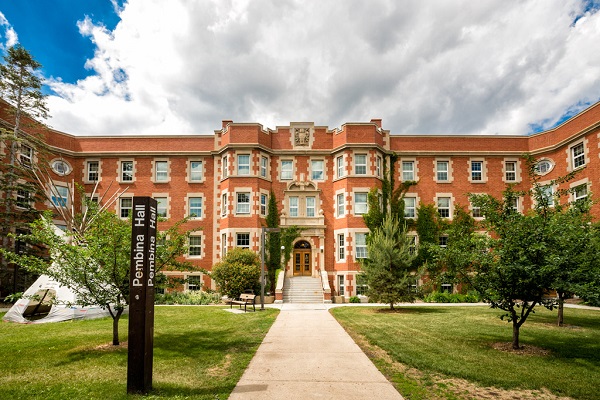University of Alberta: Theatre director Reneltta Arluk examines colonization in U of A production of classical play
Reneltta Arluk admits being the first Indigenous woman to graduate from the University of Alberta’s BFA acting program in 2005 was a hard-won distinction.
In a moment of frank disclosure, Arluk recalls confronting no small measure of racial bias among certain faculty members who made her feel she had no right to be there.
Some of them apologized years later, and she now wants to be clear: “There were some faculty that really championed me and understood how important it was that I be there, and I’m eternally grateful to those faculty.”
Arluk was born and raised in the small town of Fort Smith, N.W.T., gateway to Wood Buffalo National Park. Because her stepfather worked for an oil company, the family migrated through various towns across Alberta and Saskatchewan in her teen years.
By 17 she was on her own, eventually enrolling in Toronto’s Centre for Indigenous Theatre, and after a summer in Whitehorse performing as an original member of the Indigenous artist collective there called Raven’s Tale Theatre, she drove to Edmonton to audition for the U of A’s BFA acting program.
‘What makes a great storyteller is a great actor’
She was the first in her family to become an artist but comes from a long line of storytellers. “I was born a storyteller,” she said, “and my grandfather was a great storyteller. People would always make a trip to visit even when we lived in the bush.”
When she returned to the North after a long absence, she asked herself what she could do to keep those stories alive.
“My mentality was that no one forgets a good story—it can last generations. I thought what makes a great storyteller is a great actor. That’s how I ended up in theatre school.”
What stands out in Arluk’s journey is resilience. By the time she arrived at the U of A, she was a little older than other students in the program. Despite the systemic hurdles, she was determined to soak up everything the program had to offer.
“I wanted to make sure I didn’t come out of it bitter or feeling less than, and to really utilize the gifts and tools I was taught.”
The drama training was second to none, she added—integral to her success in Canadian theatre—from her role in the all-Indigenous production of Copper Thunderbird at the National Arts Centre to establishing her own theatre company in the Northwest Territories, to her current position as Director of Indigenous Arts at the Banff Centre for Arts and Creativity.
“I’ve worked in a lot of theatres in this country, and I’ve always felt, ‘I got this, I know exactly what I’m doing here.’ I’m really good at what I do, and I attribute that success to what I learned (at the U of A),” she said.
“The BFA program was very good at building ensemble, so that you trust each other on stage, which is huge … those skills are absolutely transferable.”
Returning to the U of A for another first
Sixteen years after graduating from the U of A in 2005, Arluk now returns to the university as the first Indigenous woman to direct on the Timms Centre’s main stage, taking on a Studio Theatre production of Yvette Nolan’s The Birds to run online during the 2021 Congress of the Humanities and Social Sciences.
In Nolan’s contemporary Indigenous take on Aristophanes’ classical comedy, two men flee the modern world and end up in a Utopian land of birds, but are unable to resist remaking their newfound world in their own image.
“It’s a reflection on colonization, and really delves into an Indigenous perspective, and Indigenous knowledge,” said Arluk.
Since January, the cast of The Birds has been meeting with Arluk regularly online to examine the text and explore its Indigenous content. It begins a nearly month-long run this week.
Inviting Arluk to direct the play reflects a commitment to making the Department of Drama more inclusive, said department chair Melanie Dreyer-Lude, and to taking the Calls to Action by the Truth and Reconciliation Commission of Canada seriously.
“Systemic racism has been a university-wide problem for decades,” said Dreyer-Lude. “Bringing in Reneltta and programming The Birds is just one piece of Drama’s efforts to transform our department into a more welcoming and representative place for all students.
“It’s unfortunate we can’t make this transformation happen all at once, but we are committed to combating racism and systemic bias of all sorts in our programming, our curriculum and our interactions with students.”
The central conceit of The Birds is a deliberate choice for Studio Theatre, said Arluk, since, as birds, the characters don’t have to be played by Indigenous actors. The cast of fourth-year BFA students is almost exclusively non-Indigenous, apart from two students from outside the program recruited to play birds.
“The cast are not as diverse in culture, but are diverse in living experience,” said Arluk. “They’re a beautifully compassionate company, and I’m really excited to work with them.”
In most of her work as a professional director, however, Arluk has placed Indigenous engagement at the top of her agenda.
Since 2008 she has run her own theatre company, Akpik Theatre, the only professional Indigenous theatre company founded in the Northwest Territories. “It’s Indigenous-led and focused, and its mandate is to do northern and Indigenous stories—everything is seen through that lens.”
As for the problem of systemic racism and the movement toward reconciliation, Arluk views it as an ongoing challenge across Canadian institutions. But this production represents a step forward in the performing arts, she said.
“The directing of The Birds, and the play itself, are opening a door of invitation and welcoming for more Indigenous voices. And that is an incredible initiative.”

